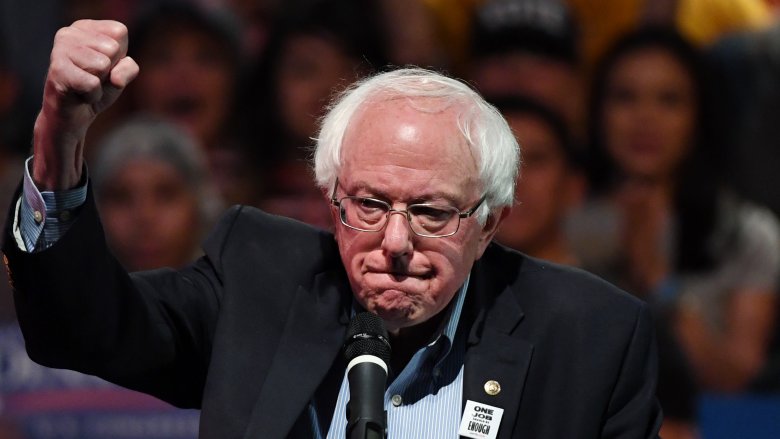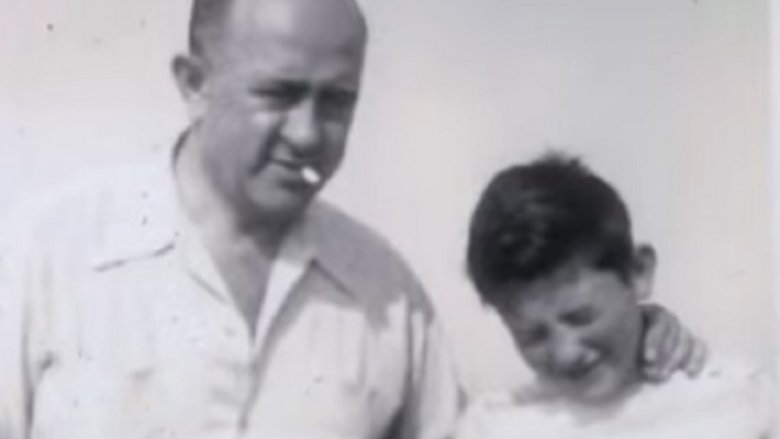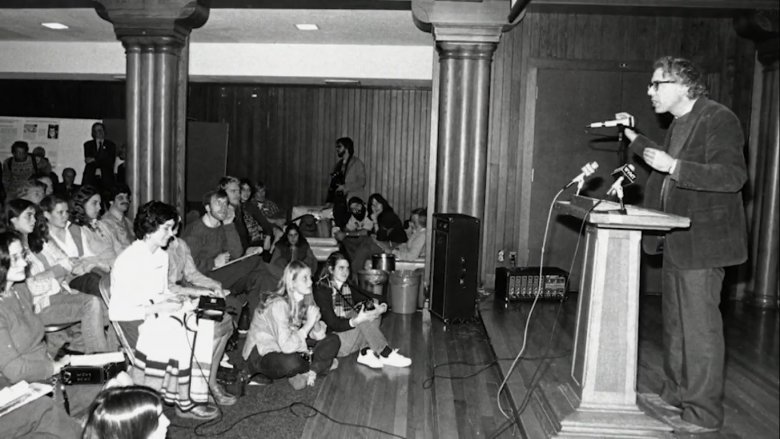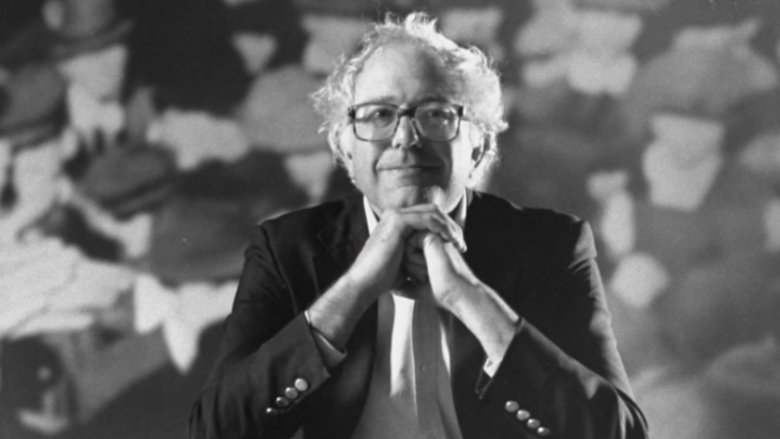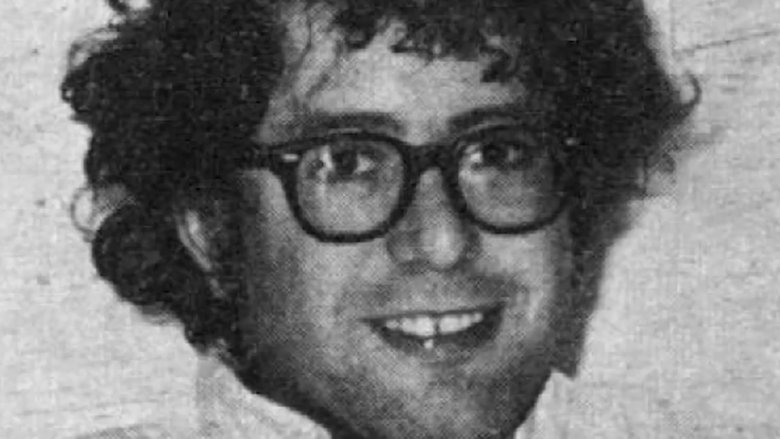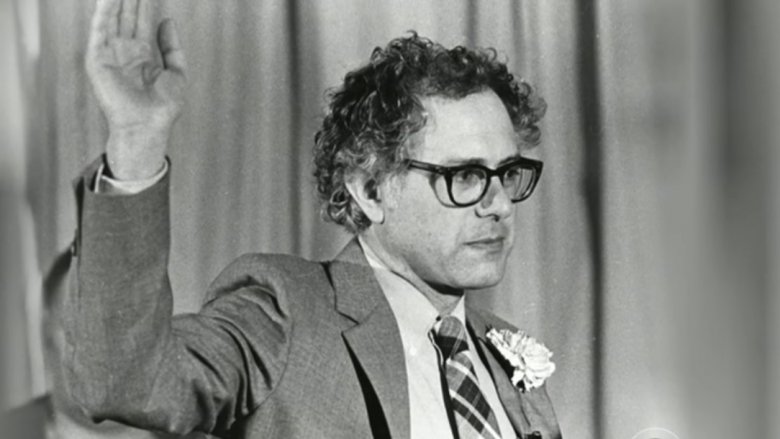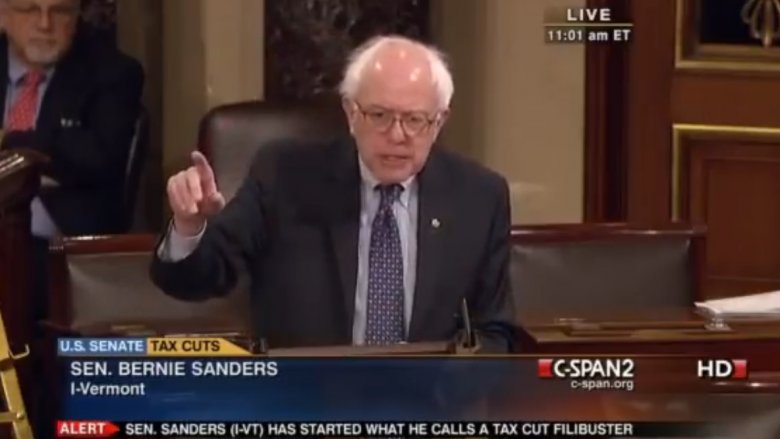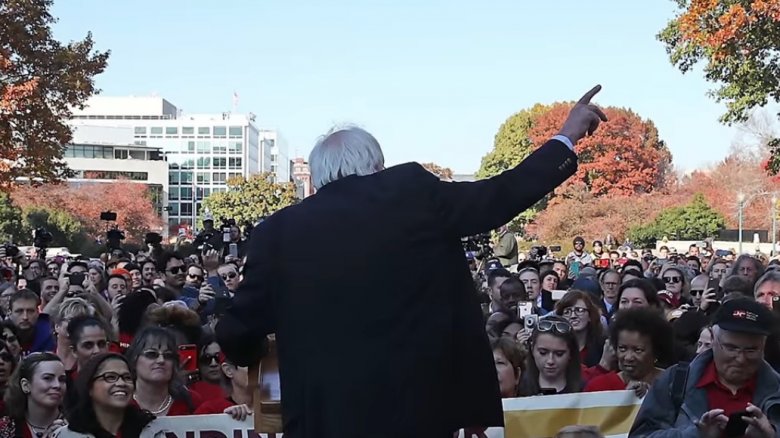The Untold Truth Of Bernie Sanders
Bernie Sanders hasn't always been at the forefront of American progressive politics, but he has been at the ... afterfront? The back of the front? You get the idea. He's been involved in a significant way for decades now, simply by virtue of being one of the only self-avowed Democratic Socialists to hold any elected office in the country, at least in the modern era. Way back in the day, the Socialist Party of America had plenty of success getting officials elected, from the 19th century right up until 1946, when the word "socialist" had been rendered dirty by a certain German political party that totally corrupted its meaning.
The stigma around the word lingers to this day, but as Bernie will tell you, "socialism" describes — in a nutshell — a society which takes care of all of its people, not one that subscribes to the motto "free stuff for everyone, and damn the consequences." (And certainly not "Nazi" — if you think the Nazis were socialist, we've got some bad news for you about the Democratic People's Republic of Korea.) For his entire decades-long political career, Bernie has worked to advance the notion that a country as obscenely wealthy as the United States should take care of its least fortunate citizens — and the old guy doesn't appear to be slowing down. Let's take a look at some lesser-known facts about Bernie Sanders, the coolest grandpa America has ever had.
His family is from Poland
Bernie's father, Eli Sanders, was a Jewish boy who lived his early life in the farming backwater of Slopnice, Poland, a region which the Polish government had been allowing to die on the vine for over a century. A paint salesman, Eli found little opportunity to make big bucks in a country where Jews were not allowed to own farmland, and so — due to this, or perhaps a particularly strong spider-sense — the 17-year-old emigrated to the U.S. in 1921. It's a damn good thing he did, because by 1942, the rest of the Jews in the area were also gone. That is to say, they were all executed by the Nazis.
With little money or command of the English language, Eli came to the USA to pursue the American dream, and there he met and married New Yorker Dorothy Glassberg. Dorothy gave birth to son Larry in 1934 and Bernie in 1941, but they struggled financially, unable to move out of their rent-controlled apartment. It was these rough early years that first gave young Bernie and his older brother a taste of economic inequality in the U.S., and the lesson stuck with both of them. Larry would eventually move to the U.K., and today he's also a politician — currently health spokesperson of the Green Party of England and Wales, who says his politics are "99.9 percent indivisible" from those of his younger brother.
He was a high school track star
As a teen, Bernie Sanders attended James Madison High School in Brooklyn, where one might have expected him to have been captain of the debate team or some such. But as difficult as this may be to picture, he was actually captain of a different team, which had a reasonable amount of success during his tenure. Speaking with CNN in 2016, Bernie said, "I was a very good athlete. ... I [took] third place in the New York City indoor one-mile race. I was a very good long-distance runner — not a great runner, but I was captain of my cross-country team, won a lot of cross-country meets and certainly won a lot of races."
According to the Washington Post, as a senior in 1959, his team was so awesome that the 1960 graduating class continued to brag about it in their yearbook, name-checking Sanders early and often despite his having graduated. During Bernie's presidential run, the Post caught up with Richard Creditor, who was a year ahead of Sanders and had captained the team up until his graduation. Creditor, who eventually attended the University of Maryland on a track scholarship, had no trouble recalling his days training and competing with the future Senator: "I remember Bernie being tall. Good athlete. Fairly big guy. Good runner. I'll say he never beat me, but that's another story. But he was a good athlete."
He fought for civil rights in the '60s
Bernie attended Brooklyn College for a year before transferring to the University of Chicago. Then, as now, the city was a focal point in the debate over race relations in the U.S., with the civil rights movement just beginning to crank into high gear. Bernie wasted no time in picking a side in the debate, and we'll give you three guesses as to which side that was. (The first two guesses don't count.) Long before the words "white" and "privilege" had ever been put together, Bernie recognized the inherent immorality of sitting there doing nothing while police were spraying unarmed black protesters with fire hoses and throwing them in jail for exercising their right to free speech. By the early '60s, he had become chairman of his school's chapter of CORE, the Congress for Racial Equality, and he also had the idea to merge the organization with the Student Nonviolent Coordinating Committee, to put their ideals into action.
Bernie helped lead the first known sit-in at the university when he and 33 fellow students posted up outside the president's office to protest segregated housing on campus. In 2016, the Chicago Tribune unearthed an archive photo of the young activist getting arrested during a protest in 1963. Presented with the photo, Bernie wasn't sure if it was him or not — until he compared it to the photo from his student ID, which he still had in his wallet.
He's always been a pacifist
As one might expect, Bernie Sanders wasn't exactly having it when young men started getting drafted en masse to fight in the Vietnam War. As a pacifist, he felt that war should always be the last answer to just about any question, and as such he applied for conscientious objector status once the draft really started getting into gear. He was never granted this status, however; you may be shocked to learn that the wheels of U.S. bureaucracy moved just as slowly then as they do now. By the time his application was processed, Bernie was too old to be drafted anyway.
As one might also expect, this was used against him frequently during his presidential campaign, but Bernie has never made any secret of his pacifist leanings. As a congressman, he has rarely voted to authorize the use of force, even after Iraq's invasion of Kuwait in 1991. He did, however, authorize military action after the terrorist attacks of September 11, explaining his thought process to ABC News: "I believe that the United States should have the strongest military in the world. We should be working with other countries in coalition. And when people threaten the United States or threaten our allies, or commit genocide, the United States, with other countries, should be prepared to act militarily."
He didn't seem destined for anything
Bernie graduated with a degree in political science in 1964, and that same year married his first wife, Deborah. They bought a meager property in Vermont — according to Politico, literally a shack with a dirt floor, which may have been partly why the marriage ended in 1966. For the next few years, Bernie sort of floated around, working at nonprofits and at a psychiatric hospital, and fathered his only child, Levi (pronounced "LEH-vee"), in 1969 with his girlfriend Susan Mott. That relationship didn't last either, and as he entered the '70s, Bernie was a single father with few marketable skills and even fewer prospects.
Politico caught up with a few friends from those days, and they all described him as a guy with a lot of great ideas who seemed destined to be a broke hippie forever. "The electricity was turned off a lot," recalled one. "I remember him running an extension cord down to the basement. He couldn't pay his bills." He tried his hand at running his own carpentry business, which didn't work out on account of his being "sh*tty" at carpentry, and he was perpetually unemployed and dirt-poor. But he was also involved with the scrappy Liberty Union party, who were looking for a candidate to run for Vermont governor in 1972 — and, simply because he couldn't think of anything better to do, Bernie volunteered.
Breaking into politics wasn't easy
What followed were no fewer than four unsuccessful campaigns for public office in the '70s — two for governor of Vermont and two for the U.S. Senate. One might expect that he'd become discouraged, but instead, he resolved to set his sights on a slightly less lofty position. In 1981, he ran for mayor of Burlington — Vermont's largest city — in a hotly contested six-way race. Amazingly, he won by the skin of his teeth, only ten votes ahead of the next closest challenger. He then proceeded to get re-elected three times, each time by a wider margin, serving as Burlington's mayor from 1981 to 1989.
During this time, he mounted another gubernatorial campaign (unsuccessful) and ran for a seat in the U.S. House of Representatives (also unsuccessful), but it increased his profile in Vermont politics. In 1990, he ran once again for the House — and finally won, taking his seat in Congress as an independent Democratic Socialist during the reign of George H.W. Bush and the events leading up to the Iraq War. He would go on to serve eight terms in the House, easily the longest tenure of any independent in that institution's history, before running for the Senate in 2006 and winning his seat with a whopping 65 percent of the vote.
He recorded a folk album in the '80s...
While mayor of Burlington, Bernie Sanders found time to dedicate himself to a side project that is almost certainly unique in the annals of American politics. Inspired by U.S.A. for Africa's "We Are the World," he decided to assemble a stable of the finest musicians Vermont had to offer to record a benefit album of his own after local music studio owner Todd Lockwood pitched the idea. Enlisting the help of such trailblazing musical luminaries as future Vermont Senator Dick McCormack, Bernie and Lockwood recorded the folk album We Shall Overcome — which is just as head-slappingly earnest and hilarious as you think it is.
We know what you're probably wondering: Did Bernie actually perform vocals on the album? He sure did. We also know what your follow-up question is: Can Bernie sing? No, not a single note. Bernie cannot carry a tune in a briefcase, and he did not try. His vocal performances on We Shall Overcome basically consist of him reciting lyrics over folksy music in the exact same manner in which he delivers his speeches, weird Brooklyn accent and all, while actual singers occasionally coo in the background. The fact that this album — which moved a staggering 2,000 copies — even exists is proof that while the moral arc of the universe may bend toward justice, its emotional arc bends toward Monty Python-esque deadpan humor.
...and had a brief movie career, too
Not content to infiltrate just one aspect of the entertainment business, Bernie has also found time to indulge in a brief and hilarious film career. In 1988, just a year after his senses-shattering musical debut, he appeared in the 1988 rom-com Sweet Hearts Dance, starring Jeff Daniels and Susan Sarandon. The film is set in Vermont, and Bernie appears as himself, doling out candy to the lead characters' trick-or-treating children. The exchange is interrupted by a bunch of lunkheads throwing eggs at his house, making the whole 45-second scene an oddly prophetic metaphor for his eventual presidential campaign.
But Bernie wasn't done with Hollywood. In 1999, he inexplicably appeared in a slightly more substantial role as a rabbi in the Debbie Gibson-starring "My X-Girlfriend's Wedding Reception," a film which has nothing to do with the X-Men, and which so few people have seen that a couple brief clips on YouTube are all the hard evidence we have that it actually existed. Speaking at the titular reception, Bernie's character briefly pays lip service to the joyous event before launching into a tirade about the Dodgers leaving Brooklyn. (It's obviously a subject close to his heart.) Bernie stumbles over his first few lines, but once the Dodger-bashing begins, he speaks clearly and with utter conviction. Bernie's filmography conspicuously dried up after '99. Perhaps after the tour-de-force that was this scene he simply had no acting left in him.
The speech
In 2010, Bernie came into the national spotlight the way many politicians do: with a high-profile speech. He didn't intend for the speech to raise his stock. Republican senators were on the verge of passing an extension on Bush-era tax cuts, Bernie wasn't happy about it, and he wanted to voice his displeasure to his colleagues. And voice it he did, for eight and a half hours.
For obvious reasons, the speech has been referred to as a filibuster, even though Bernie wasn't actually filibustering anything. It happened on a Friday, and the Senate had already resolved to vote on the issue the following Monday; no amount of speechifying was going to change that. But Bernie's position against the extension was one held by a majority of Americans according to polls at the time, and he figured that he was the one to express this to his peers by way of being a gigantic pain in all their rear ends. The speech helped strengthen Democratic resolve on the issue, and shortly after there came the first rumblings of a Sanders presidential run. Of course, this would take another five years to materialize and would ultimately end in defeat with the nomination of Hillary Clinton, but The Speech began Bernie's national rise as the face and voice of the Little Guy, and if anything, his failure to secure the 2016 nomination only made him more determined to get his message of economic and social equality across.
His reason for getting into politics
More than just a desire to be a champion of the 99 percent, however, Bernie's run in politics has been driven by a resolve to remove from power those who would inflict the sort of harm perpetrated by those who devastated his family's homeland. As mentioned, his Jewish family came from Poland — where 90 percent of the Jewish population was wiped out by the Nazis. Bernie's drive to become a politician stemmed from a moral imperative to "prevent the descent of humanity," an imperative which hasn't diminished in the years since the 2016 election.
He made this clear in a 2017 speech shortly after the disastrous neo-Nazi "Unite the Right" rally in Charlottesville, Virginia. "In both Europe and the United States, the international order which the United States helped establish over the past 70 years, one which put great emphasis on democracy and human rights ... is under great strain," he said. "We ... see a rise in authoritarianism and right wing extremism — both domestic and foreign — which further weakens this order by exploiting and amplifying resentments, stoking intolerance and fanning ethnic and racial hatreds among those in our societies who are struggling."
It's a timely message, but also one that Bernie has steadfastly been preaching for the last four decades. There will always be those within the establishment who wish he would just shut up and go away, but if they think that's happening anytime soon, they simply don't know Bernie Sanders.
